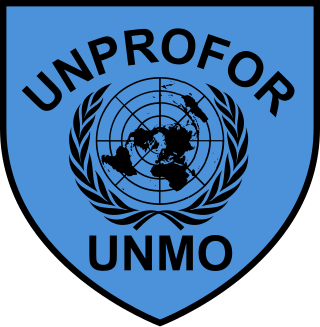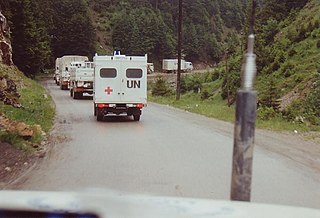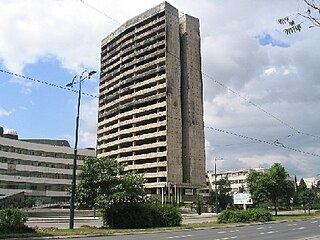
The United Nations Protection Force was the first United Nations peacekeeping force in Croatia and in Bosnia and Herzegovina during the Yugoslav Wars. The force was formed in February 1992 and its mandate ended in March 1995, with the peacekeeping mission restructuring into three other forces.

Operation Deliberate Force was a sustained air campaign conducted by NATO, in concert with the UNPROFOR ground operations, to undermine the military capability of the Army of Republika Srpska, which had threatened and attacked UN-designated "safe areas" in Bosnia and Herzegovina during the Bosnian War with the Srebrenica genocide and Markale massacres, precipitating the intervention. The shelling of the Sarajevo marketplace on 28 August 1995 by the VRS is considered to be the immediate instigating factor behind NATO's decision to launch the operation.

United Nations Security Council resolution 819, adopted unanimously on 16 April 1993, after reaffirming resolutions 713 (1991) and all (1992) subsequent resolutions, the Council expressed concern at the actions of Bosnian Serb paramilitary units in towns and villages in eastern Bosnia and Herzegovina, including attacks on civilians, the United Nations Protection Force and disruption to humanitarian aid convoys. The resolution marked the UN's first civilian "safe area" being declared; it failed to prevent the Srebrenica massacre.

The NATO intervention in Bosnia and Herzegovina was a series of actions undertaken by NATO whose stated aim was to establish long-term peace during and after the Bosnian War. NATO's intervention began as largely political and symbolic, but gradually expanded to include large-scale air operations and the deployment of approximately 60,000 soldiers of the Implementation Force.

United Nations Security Council resolution 824, adopted unanimously on 6 May 1993, after considering a report by the Secretary-General Boutros Boutros-Ghali pursuant to Resolution 819 (1993), the council discussed the treatment of certain towns and surroundings as "safe areas" in Bosnia and Herzegovina.

United Nations Security Council resolution 836 was adopted on 4 June 1993. After reaffirming Resolution 713 (1991) and all subsequent resolutions on the situation in the former Yugoslavia, the Council expressed its alarm at the continuing situation in Bosnia and Herzegovina and decided to expand the mandate of the United Nations Protection Force (UNPROFOR) by allowing it to use force to protect the "safe areas".
United Nations Security Council resolution 844, adopted unanimously on 18 June 1993, after reaffirming Resolution 713 (1991) and subsequent resolutions, the Council noted deteriorating situation in Bosnia and Herzegovina and authorised a reinforcement of the United Nations Protection Force (UNPROFOR).

United Nations Security Council resolution 859, adopted unanimously on 24 August 1993, after recalling all resolutions on the situation in Bosnia and Herzegovina, the council noted that, despite all previous security council resolutions since Resolution 713 (1991), the region was still a scene of hostilities and there was little compliance with previous resolutions, particularly by the Bosnian Serb party.

United Nations Security Council resolution 900, adopted on 4 March 1994, after reaffirming all resolutions on the situation in Bosnia and Herzegovina, the Council discussed the restoration of essential public services and normal life in and around the capital Sarajevo.
United Nations Security Council resolution 908, adopted unanimously on 31 March 1994, after reaffirming all resolutions on the situation in the former Yugoslavia and in particular Resolution 871 (1993), the council extended the mandate of the United Nations Protection Force (UNPROFOR) until 30 September 1994 and declared its intention to increase the number of personnel in the peacekeeping force.

United Nations Security Council resolution 913 was adopted unanimously on 22 April 1994, after reaffirming all resolutions on the situation in Bosnia and Herzegovina and also Resolution 908 (1994). The Council discussed the situation in the safe area of Goražde and a settlement of the conflict.

United Nations Security Council resolution 941, adopted unanimously on 23 September 1994, after reaffirming all resolutions on the situation in Bosnia and Herzegovina, the Council discussed violations of international humanitarian law in Banja Luka, Bijeljina and other areas of the country.

United Nations Security Council resolution 942, adopted on 23 September 1994, after reaffirming all resolutions on the situation in Bosnia and Herzegovina, the Council reinforced measures relating to safe areas under control of Bosnian Serb forces.

United Nations Security Council resolution 959, adopted unanimously on 19 November 1994, after recalling all resolutions on the situation in Bosnia and Herzegovina including resolutions Resolution 824 (1993) and Resolution 836 (1993), the Council discussed the efforts of the United Nations Protection Force (UNPROFOR) to ensure the implementation of security council resolutions in the safe areas of Bosnia and Herzegovina.

United Nations Security Council resolution 981, adopted unanimously on 31 March 1995, after reaffirming all resolutions on the situation in the former Yugoslavia, the council established the United Nations Confidence Restoration Operation in Croatia (UNCRO) for a period terminating 30 November 1995.

United Nations Security Council resolution 998, adopted on 16 June 1995, after reaffirming all resolutions on the conflicts in the former Yugoslavia, in particular Resolution 982 (1994), the council established a rapid reaction force of up to 12,500 personnel within the United Nations Protection Force (UNPROFOR) in Bosnia and Herzegovina following attacks on it and the overall deteriorating situation.

United Nations Security Council resolution 1010, adopted unanimously on 10 August 1995, after recalling all resolutions on the situation in the former Yugoslavia and reaffirming Resolution 1004 (1995), the Council demanded that the Bosnian Serbs release all detained persons and permit access to them by international humanitarian organisations.
United Nations Security Council resolution 1019, adopted unanimously on 9 November 1995, after recalling resolutions 1004 (1995) and 1010 (1995) on the situation in Bosnia and Herzegovina and 1009 (1995) concerning Croatia, the Council discussed violations of international humanitarian law in the former Yugoslavia.

United Nations Security Council resolution 1031, adopted unanimously on 15 December 1995, after recalling all previous resolutions on the conflicts in the former Yugoslavia, the council, acting under Chapter VII of the United Nations Charter, discussed the transfer of authority from the United Nations Protection Force (UNPROFOR) to the multinational Implementation Force (IFOR).

United Nations Security Council resolution 1034, adopted unanimously on 21 December 1995, after recalling previous resolutions including Resolution 1019 (1995), the Council discussed violations of international humanitarian law in the former Yugoslavia, specifically in Bosnia and Herzegovina.

















